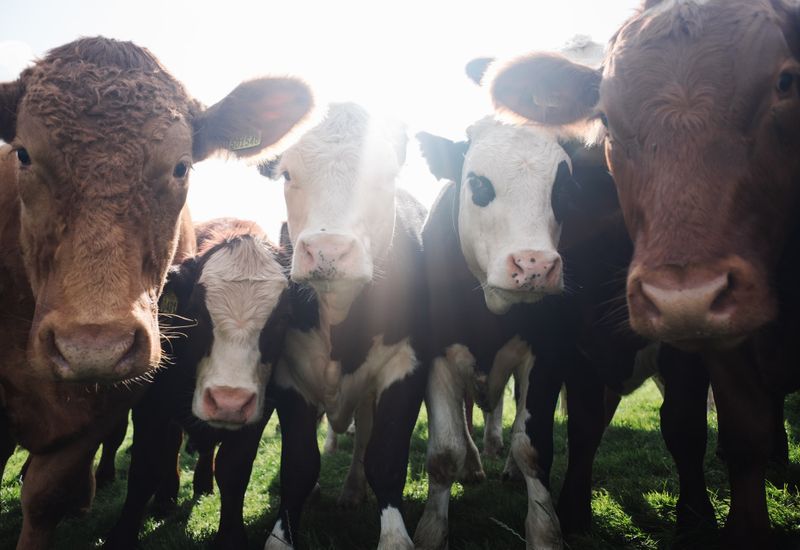Livestock farming has a huge carbon footprint, so here are some ways to cut down on your meat and dairy intake.
With the impact humans are having on the environment, we all need to do our bit to tackle climate change and live more sustainably. According to a report by the UN in 2015, over 1/3 of our emissions come from food production. Carbon emissions from meat and dairy products are double that of plant-based foods. With global warming quickly becoming the biggest threat to humanity today, we urgently need to cut down on meat and dairy consumption.
Why are meat and dairy so bad for the environment?
Lots of different factors contribute to the overall carbon footprint of a food product. The biggest impacts are found in land use and production processes. Land use means that land has been taken over for a specific cause, reducing biodiversity and releasing harmful gases. For example, deforestation to make space for cattle grazing. Production processes include things such as fertiliser and pesticide use.
Here are the percentages of emissions from the different stages of food production:
- Land use (39%)
- Production process e.g., fertilisers (38%)
- Distribution process i.e., packing, shipping, processing (29%) (According to a UN report)
How can you measure your food’s impact on the environment?
To eat more sustainably, meat and dairy substitutes will help mitigate some emissions from land use and production processes. But replacing a meaty burger with a highly processed and plastic-packaged veggie burger might not reduce your overall carbon footprint by that much. Instead, you could go for an option which involves less processing, like a portobello mushroom.
Top tips for eating sustainably:
Go nuts for nuts!
- Peanuts and other nuts have a really low carbon footprint, and they are really high in protein, so munching on some peanut butter toast could actually save the planet! This is because they are often planted between crops of other plants to replenish the soil, meaning their negative land use is less impactful.
- Peanut butter is also a great source of protein, it goes in curries, noodle dishes, with your breakfast or even with a spoon straight out of the tub.
Make your meals creamy with Tahini!
- Tahini is a middle eastern condiment made of blended sesame seeds, it's available in most local and international supermarkets. It's a great source of protein and tastes like liquid gold.
Chickpeas, beans, and lentils are your friend!
- Collectively known as legumes, they have a relatively small carbon footprint and are a great addition to basically any meal – pasta, curry, salad, you name it. You can also blend up chickpeas with tahini to make houmous.
@daphneoz This tahini sauce is perfect for when you’re craving a creamy dip for your veggies…or anything else, tbh 😋 And it’s dairy-free! #tahinisauce #foodie ♬ Chill out lofi hip hop(912904) - osuga satoshi
| Dairy/meat product | Low-carbon replacement | Meal ideas |
|---|---|---|
| Cheese | Yeast flakes; tahini; blended cashew nuts with oat milk | Tahini pasta bake; macaroni no cheese |
| Milk | Non-dairy milks e.g., oat, coconut, almond | Cereal; porridge; smoothies |
| Cream | Coconut cream | Curries and dahls |
| Chicken | Chickpeas, tofu | Roast dinner; salad |
| Mince | Beans e.g., kidney, borlotti or red lentils | Spaghetti bolognese; chilli non carne |
| Burger | Portobello mushrooms | BBQs; burger nights |
| Meat chunks | Tofu chunks | Stews or pies |
How can you make the transition to vegetarianism easier?
Don’t cut out everything at once.
If you’re a regular meat and dairy consumer, don’t try to cut out all your regular meals straight away. Start small, for example, change to non-dairy milk, or swap out a ham sandwich for an avocado sandwich at lunchtime. Eating sustainably shouldn’t feel like you are depriving yourself, so have some fun testing out new vegan recipes and find something you really like the taste of.
Talk to your friends about it.
Food is a great thing to share with other people. Chatting to your friends about some non-dairy or non-meat meals they have enjoyed is a great way to increase your confidence in the kitchen and get used to eating more sustainably.
Prospective student? We want to hear from you! Join the Student Hut Forum and earn £s by taking surveys.













